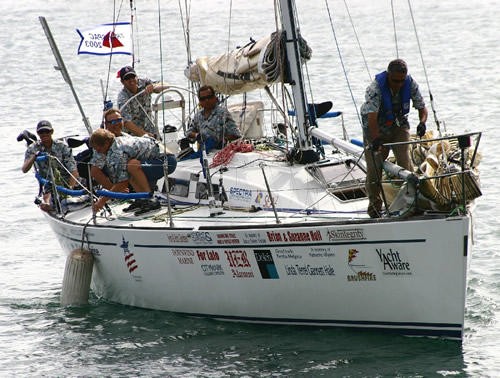Boat donation on second run to Hawaii
by Challenged America on 6 Jul 2005

Challenged America onboard B-Quest sailing into Hawaii at the end of the 2003 Transpac Rich Roberts
http://www.UnderTheSunPhotos.com
Donating your boat to a charitable organization can still be a tax-deductible, financial strategy under the new vessel and vehicle IRS regulations, if you select the right user-charity -- a 501(c)(3) organization that uses your gift in a qualified program -- may still bring you financial and personal rewards.
For example, take Challenged America, a charitable recreational rehabilitation sailing program for children and adults with disabilities, based in San Diego, California. Boat donations to this charitable program travel far, including all the way to Hawaii (in the 2003 Transpac) and again in the 2005 Transpac.
Brian and Suzanne Hull of Coronado, California, were looking for a charity that would be able to use, not just sell at any price, their Tripp 40 design racing sailboat -- a boat they raced extensively in Southern California and loved. Their plan was to find a qualified charity and then purchase a larger racing sailboat. Introduced to Challenged America by Steve Rock, owner of Fiddler's Green Restaurant, Shelter Island, the Hull's met with Urban Miyares, co-founder of Challenged America to discuss the donation.
‘We were eagerly looking for a quality racing sailboat that we could add to our program and use for coastal and offshore races like Transpac, and one we could readily modify and adapt to the unique needs of the various disabilities of our Challenged America program participants,’ said Urban Miyares, a blinded Vietnam veteran and president of the Challenged America program's charity. ‘Couldn't believe when Mr. and Mrs. Hull approached us, and I don't think they then realized how dramatically their donation would change the lives of people with disabilities, and how many nautical miles we would put under the boat's keel in our program.’
In March, 2002, the Hulls donated their Tripp 40 (then named TrippZ) to Challenged America and the organization renamed the boat B'Quest in honor of the bequest received by the Hulls. Immediately, a crew of sailors from Challenged America raced B'Quest in a shake-down sail, the 2002 Newport to Ensenada race, followed by months of extensive modifications, including innovative adaptations designed to help sailors with disabilities be able to safely sail the 40-footer in any sea condition.
From installing a steering wheel to customized (first-generation, prototype) helm and trimming seats for sailors having limited mobility, moving the winches, fittings, blocks and lines to make it more functional for the crew, designing an elevator system so sailors unable to walk could get below. and then be able to transfer onto a customized slide bench and be able to move forward to the head, and aft to the rear bunks below deck, with handrails strategically placed throughout the boat.
B'Quest quickly became the Challenged America R&D boat, with innovative devices and equipment, prototypes designed, and adaptations mounted and installed, and then tested under sea conditions by sailors with disabilities. San Diego State University School of Engineering class projects have students problem-solving and creating prototypes, with mentoring by Challenged America participants, that enhance the performance, comfort and safety of sailors with disabilities, in the harsh environment of the open ocean.
B'Quest can be seen regularly on San Diego Bay and offshore, in its TGIF sails (for beginners and supporters), the Wednesday Gentleman's Race, Beer Can races, Newport to Ensenada and San Diego to Ensenada races, yacht club and sailing association races and regattas. And, of course, Challenged America Sail Team will be racing B'Quest in the Centennial 2005 Transpac, their second trip across the Pacific, starting July 10.
‘It's unfortunate that many boat owners, yacht brokers and many CPA's are not fully aware of the still available IRS tax benefits, under the new IRS regulations, on boat and vehicle donations. We are looking for more quality boats, like B'Quest, to add to our program,’ said Miyares. ‘For nonprofits that do not have a qualified marine or boating related program that meets their mission, or are unable to use a boat or vehicle donation in their programs, the amount of the tax write-off by donors of a boat or vehicle donation has changed dramatically. But donate to a qualified charity meeting its mission, like Challenged America, and the donor may still be able to get a full donation based on one or more of the three exceptions under the new IRS ruling on boat and vehicle donations to a qualified, user charity. Boat donations are a critical source of income to our free adaptive sailing program, and many donors may still be able to meet current IRS requirements, and also help us out.’
Challenged America is a recreational rehabilitation program of the Disabled Businesspersons Association, a charitable 501(c)(3) nonprofit. Providing free learn-to-sail and advanced sailing programs and opportunities for kids and adults with disabilities since the late 1970's, Challenged America relies on vessel and vehicle donations, contributions by the general public, grants, sponsorship and fundraising events to fund its free programs. Currently, Challenged America has 12 donated or gifted sail and power boats (14 to 40 feet in length) in its program, located at Shelter Cove Marina, San Diego, CA.
Donating your vessel or vehicle to a qualified (user) charity may still hold many advantages for donors. For additional information on how you may qualify to receive the maximum tax-deduction benefit with your power or sailboat donation, and help a worthy charity who uses boating as a rehabilitation activity, contact Susan Scott, CHALLENGED AMERICA, 2240 Shelter Island Drive, Suite 206, San Diego, CA 92106, email Susan@ChallengedAmerica.org, phone (619) 523-9318. or visit www.ChallengedAmeica.org.
If you want to link to this article then please use this URL: www.sailworldcruising.com/17971